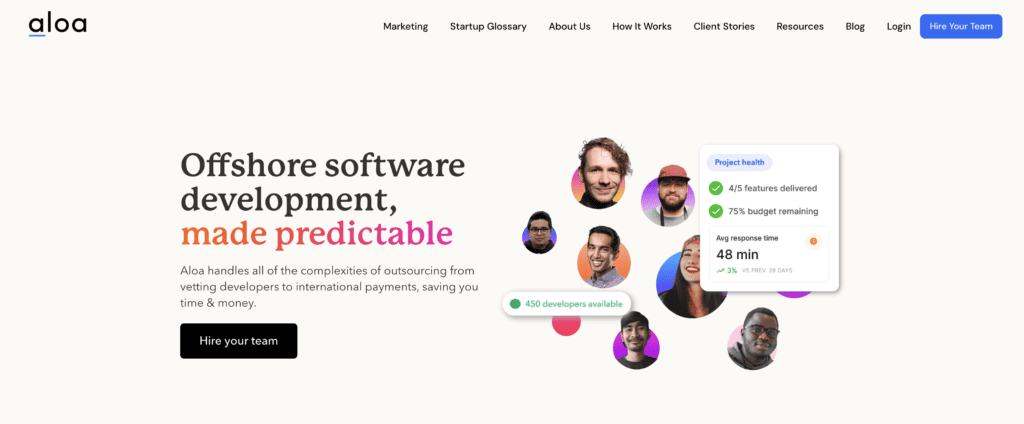
Hi David! What’s your background, and what are you currently working on?
My background has always been in entrepreneurship. I worked on my first startup my senior year of high school and jumped full-time into another startup I helped co-found, Aloa.co, my senior year of college. I am still working on Aloa as my main full-time focus. I also have a couple other companies in the making: Bracketology and Fifth Star Funds.
- Aloa is a network of highly vetted software agencies around the world with our own proprietary tools and processes to make software outsourcing predictable.
- Bracketology is building fantasy sports for reality TV, building the next generation of secondary entertainment for reality TV.
- Fifth Star Funds is a venture philanthropy fund focused on investing in Black tech founders and shrinking the racial wealth gap.
How did the idea for Aloa come about, and what was the pivotal moment when you decided to turn that idea into a reality?

Aloa started while we were students at Vanderbilt. The team was building out apps and doing student tech consulting when we tried to expand our development team. We looked into outsourcing and decided to go for it, assuming that as a majority technical team, we had what it took to outsource successfully.
We could not have been more wrong. It was an absolute nightmare. If we, as a technical team, struggled to work with developers around the world, then how would startup founders manage this if they weren’t technical?
We decided to do something about it, first focusing on solving our own problems and seeing if we could create a predictable and consistent solution to software outsourcing.
You now have 11 team members. How has Aloa evolved since its inception, and what factors have contributed most to its growth?
Aloa has changed a ton since our early dates. The main evolution of Aloa comes from the innovations within our model. We have spent a considerable amount of time investing in our own tools and processes to make software outsourcing more seamless.
Every week, we review pain points that everyone logs from every experience. This allows us to crowdsource headaches that still exist. We then are able to analyze the root causes of these headaches and build tools and processes to mitigate them for future experiences.
The improved Client success rate has led to stronger Client retention and stronger lead generation. We also have put a considerable investment into our digital marketing efforts. Having focused so heavily on writing engaging content, we’re starting to see the fruits of our investment, going from 1-2 organic inbound leads per month to 40-50.
We have a whole marketing division now that is focused on strengthening our web presence and allowing us to more organically grow our business and be a recognized authoritative voice of our space.
What were some of the biggest challenges you faced in the early days of Aloa, and how did you overcome them?
I would say that the biggest challenges came from a lack of processes and tools. In the early days, it was a lot of “fake it until you make it” mentality.
We would have Client-facing processes that made things seem automated and seamless, but in reality, behind the scenes, it was just us.
In order to best understand a problem and derive a proper solution, it is important that we personally face the pain points. So while this was challenging and frustrating, it was a necessary step in Aloa’s growth. It required discipline and patience, but ultimately, we overcame all of the hurdles because of our belief in our vision and what we are building here: the next generation of international working relationships.
What are your main acquisition channels?

Our main 2 acquisition channels are referrals and organic inbound web leads driven through SEO.
If you had the chance to do things differently, what would you do?
If I could do things differently, the only thing I would change is trying to scale too quickly. I think we thought we had solid product-market fit before we were actually there.
Leads were coming in, and things were growing, so we started to optimize for scale, but in reality, we just weren’t there yet.
We had a lot of little details that needed to be optimized in order to properly scale, and in doing so, I think it set us back a little bit. At the end of the day though, it was a great learning experience that has helped us position ourselves more appropriately today.
What are your goals for the future?
We want to become the gold standard for software outsourcing.
All of the enterprise companies (i.e. Google, Facebook, Amazon) will outsource their software development through consulting services (i.e. Accenture, Deloitte, IBM). They have found a predictable and scalable solution to software outsourcing, but this isn’t attainable for the average company.
The management fee required to operate at that level is too high for the typical company and thus blocks out the everyday individual from accessing predictable and scalable software development.
At Aloa, we want to democratize software outsourcing. We want to create a world where anyone can outsource at that same level of enterprise quality without having to pay the exorbitant management fees. We believe that we are building the infrastructure necessary to remove a lot of the existing inefficiencies, and in doing so, we’re building the next wave of innovation in terms of international working relationships.
Given Aloa’s position in the industry, what trends are you noticing in the software development outsourcing space, especially in 2023?

Software outsourcing is very up and down.
It is super dependent on the market. When the market is tight, companies cut spending, but they also increase their outsourcing activity, given it is more cost-efficient than in-house hiring.
For 2023 and onward, we believe that more and more companies will continue to look towards outsourcing to augment their in-house teams. Especially given remote work, the world is moving in a manner where physical boundaries no longer define teams. Aloa is looking to lean into that.
Based on your journey with Aloa, what advice would you give to entrepreneurs looking to start their own thing?
Find a problem/pain point that you personally face and look to solve it. Entrepreneurship is not easy. It requires patience and commitment. You want to be as close to the problem as possible that you are looking to solve because that means you know the problem better than anyone else.
If you know the problem inside out, you can build a better solution that resolves the true underlying pain points, not just the surface-level issues. Fall in love with the problem, not the solution.
That’s exciting – Where can people follow you?
People can look to follow Aloa through our blog. If you want to follow myself, you can find me on LinkedIn, Twitter, or Instagram – though admittedly, I don’t use social media too often. So if you really want to chat and talk shop, you can email me at david@aloa.co.

